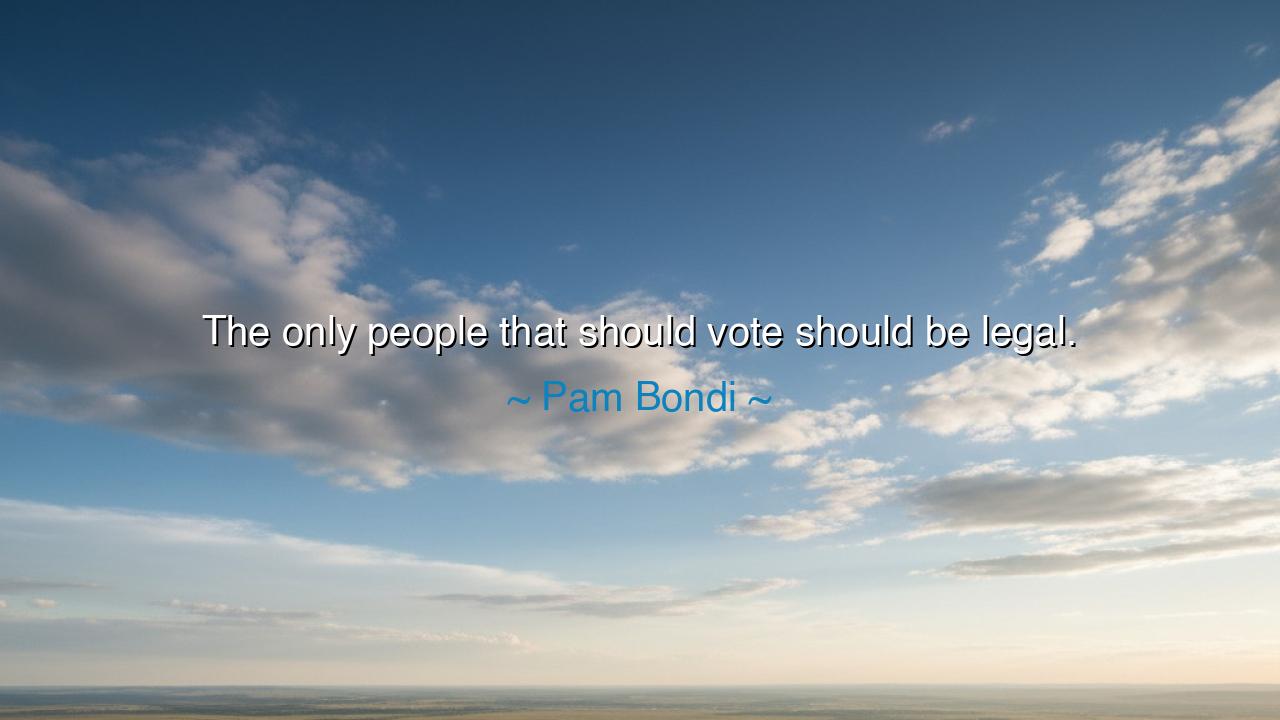
The only people that should vote should be legal.






When Pam Bondi declared, “The only people that should vote should be legal,” her words struck at the core of a nation’s eternal struggle between freedom and order, between the open gates of democracy and the guarded walls of law. To many, her statement seemed plain and self-evident; yet beneath its simplicity lies a vast ocean of history, sacrifice, and the unending question of who truly belongs to the circle of power. For every civilization that has risen under the banner of democracy has faced this test — to protect the purity of the vote without silencing the voice of the people.
The meaning of Bondi’s words must be understood in the light of her time. In America, the right to vote has been both a promise and a battlefield. It was denied to women until 1920, to African Americans in practice until the civil rights movement of the 1960s, and even now, remains a subject of fierce debate. When Bondi spoke of “legal” voters, she was speaking to a modern anxiety — the fear that the sacred mechanism of democracy could be corrupted by deception or abuse. Yet the phrase also echoes with the ancient weight of exclusion, reminding us how easily the definition of “legal” can become a tool of division.
In the ancient republics — in Athens, in Rome — the right to vote was not granted to all. It was a privilege of the citizen, earned by birth or conquest. The Athenians called it demos kratos — the rule of the people — but their “people” excluded women, slaves, and foreigners. Their democracy was pure in form, yet narrow in scope. History teaches that every nation must decide how large the circle of its citizens will be. Bondi’s words, therefore, summon the old dilemma anew: to whom does the power of the ballot truly belong — to all who dwell within a land, or only to those anointed by law?
The struggle between law and inclusion is not new. Consider the story of Susan B. Anthony, who in 1872 cast her vote in defiance of the law that forbade women from voting. She was arrested, tried, and fined. When the judge demanded payment, she refused, saying, “Resistance to tyranny is obedience to God.” Her act was “illegal,” yet it became the seed of change. History, ever the silent judge, declared her not criminal but courageous. From this we learn that legality and justice are not always twins — one may exist without the other.
Pam Bondi’s declaration reminds us that legality is a fragile construct, built upon laws that can evolve or decay with time. The word “legal” can protect a nation, but it can also imprison its spirit. The wise must discern whether the law serves the people, or whether it serves the fears of the powerful. A law that safeguards democracy is sacred; a law that excludes the deserving is a chain that must be broken. To demand legality is good — to mistake legality for righteousness is perilous.
Thus, her quote becomes a mirror reflecting both the virtue and the danger of human governance. To preserve honesty in voting is to guard the foundation of democracy; but to wield “legality” as a weapon against belonging is to betray the very purpose of the vote — to give voice to the governed. The ancients would say that a ruler’s legitimacy rests not on law alone, but on the consent of those he governs. Without justice in participation, law itself becomes a hollow shell.
Let this teaching be passed down: cherish your right to vote as you would your freedom, but remember that law must serve humanity, not the reverse. Demand fairness, demand order, but never forget compassion. For the strength of a democracy is not in how tightly it guards the gates, but in how justly it welcomes those who have earned the right to enter. Only when the legal and the just walk hand in hand can the people’s voice be both pure and powerful — a song of unity that no corruption, and no fear, can silence.






AAdministratorAdministrator
Welcome, honored guests. Please leave a comment, we will respond soon